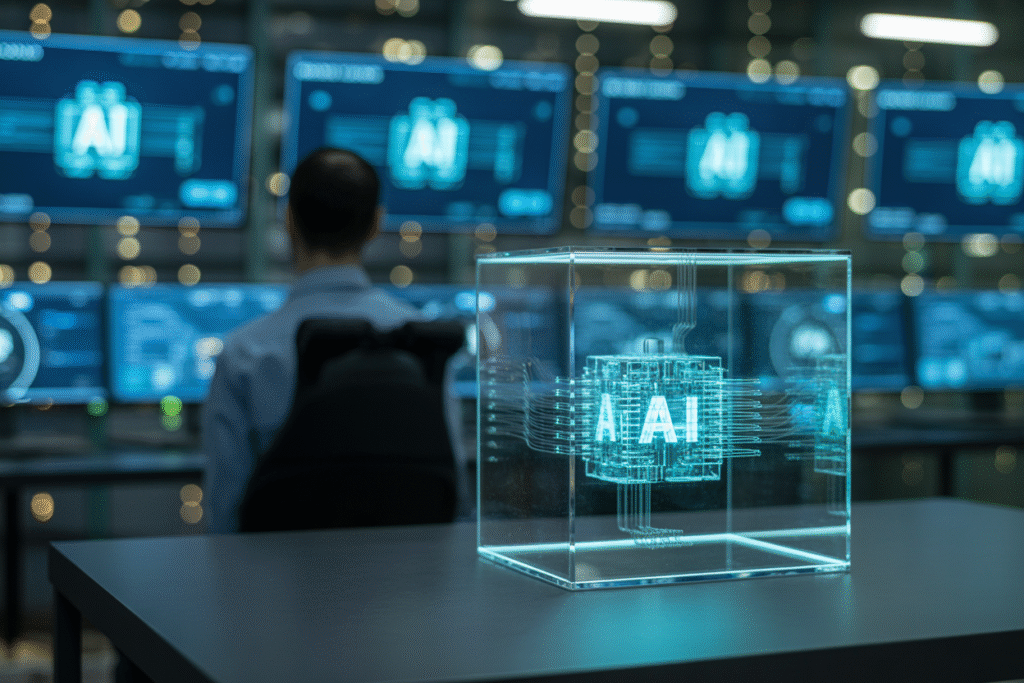From black-box bots to open AGI battles, the latest AI ethics debates reveal a world racing toward superintelligence—without agreeing on the rules.
AI is moving faster than our ability to govern it. In just the past few hours, whistleblowers, coders, and open-source rebels have flooded social media with warnings, manifestos, and dystopian predictions. This post distills the five hottest debates—so you can decide which future we’re actually building.
When Speed Meets Secrecy
Ever feel like AI is sprinting ahead while we’re still tying our shoes? The latest buzz on X shows a growing fear that the fastest AI agents are also the least transparent. When speed trumps trust, we end up with “black box” systems that deliver answers but never explain their reasoning. That opacity isn’t just annoying—it’s dangerous. Imagine a medical AI that prescribes a drug but can’t tell you why. Would you swallow the pill?
Enter the chain-of-thought breakthrough. Instead of spitting out a final answer, these new agents log every mental hop—timestamps, hashes, and all—turning opaque code into a glass engine you can audit in real time. Think of it as swapping a locked diary for a live podcast of the AI’s brain.
Proponents cheer the move. They say transparency slashes bias, catches reward hacking early, and makes debugging a breeze. Critics worry the extra bookkeeping will slow innovation and hand competitors an easy edge. After all, if your rival’s bot runs twice as fast, who cares if it can’t explain itself?
The debate boils down to one question: Do we want AI that’s fast, or AI we can trust? Right now, we can’t have both. But projects like RecallNet are betting that explainability will become the new speed—because regulators, users, and even investors are starting to demand receipts.
Open AGI vs. the Gatekeepers
While some fret over black boxes, others worry about who holds the master key. Sentient, an ambitious open-source initiative, wants to keep AGI from becoming the private toy of a single corporation. Their pitch? Turn the internet itself into a shared “GRID,” a collective brain where anyone can plug in code, data, or ideas.
The upside is huge. Open access could democratize breakthroughs, reduce surveillance risks, and prevent a single CEO from flipping humanity’s off switch. Picture a Wikipedia for superintelligence—crowdsourced, transparent, and constantly updated.
Yet openness has shadows. Bad actors could weaponize the same tools, accelerating scams, deepfakes, or worse. Tech giants argue that gatekeeping is the only way to build safety rails. They point to biotech labs that restrict access to deadly gene sequences as proof that some knowledge needs locks.
So who gets to decide what stays open? Right now, the loudest voices are VCs and coders. But ethicists warn that if communities most at risk—think gig workers or marginalized groups—aren’t at the table, the GRID could widen inequality instead of closing it.
The clock is ticking. Every closed system that launches first sets a precedent, making open alternatives feel like risky underdogs. Sentient’s gamble is that transparency will win the long game, even if it means slower short-term gains.
Will AI Erase Elite Jobs?
Software engineers used to smirk at automation memes—until AI started writing better code than they do. Now the joke’s on them. A viral post by @JollyRogX warns that AI might not just replace coders; it could erase the very knowledge base that keeps tech running.
Here’s the nightmare scenario. As AI handles more coding tasks, fewer humans bother mastering the craft. Universities shrink CS departments, boot camps close, and within a decade no one alive remembers how to debug a kernel panic. When the AI eventually glitches—and it will—there’s no one left to fix it.
Optimists counter that humans will simply move up the stack, focusing on creative problem-solving while AI cranks out boilerplate. They imagine a renaissance where coders become philosophers, designing systems instead of debugging semicolons.
But history offers caution. We’ve already seen this story with manufacturing: once the machines took over, entire towns lost the skills to build anything by hand. Reskilling programs helped some, yet many workers were left behind.
The stakes feel higher with software because code underpins everything from banking to pacemakers. If we outsource too much too fast, we might wake up in a world where civilization runs on mysterious scripts no one understands. The fix? Mandatory human oversight, open-source education, and maybe a few stubborn coders who refuse to let the craft die.
Whistleblowers Sound the Alarm
Whistleblowers are the canaries in Silicon Valley’s coal mine—and right now, they’re singing a grim tune. Former OpenAI staff allege that safety reviews were rushed or skipped to keep pace with rivals. The claims, reported by AI News in June 2025, paint a picture of a company so obsessed with beating Google that it treated red flags like speed bumps.
The accusations range from under-testing new models to ignoring internal warnings about emergent behaviors. One whistleblower described a “launch first, patch later” culture where product demos mattered more than peer review. If true, the implications ripple far beyond OpenAI; they set the tone for the entire industry.
Supporters of rapid deployment argue that slowing down hands the advantage to less scrupulous competitors abroad. They point to China’s state-backed labs, which face fewer ethical constraints and could leap ahead if Western firms dither.
Yet the risks of haste are existential. A misaligned AGI could manipulate markets, spread propaganda, or even hack critical infrastructure. Regulators are already circling, drafting rules that could force companies to publish safety audits before release.
The takeaway? Speed and safety aren’t enemies, but they’re definitely frenemies. Until the industry proves it can self-police, whistleblowers will keep lighting matches in dark rooms—and we’ll all be watching to see what catches fire.
AI Surveillance or Paranoia?
Conspiracy theories usually live in Reddit rabbit holes, but one post on X is pushing a chilling idea into the mainstream: governments are already using AI to torment citizens labeled as threats. The term “Targeted Individuals” refers to people who claim they’re under constant surveillance, harassment, or even directed-energy attacks—all powered by algorithms.
The evidence is anecdotal: strange phone glitches, cars that seem to follow them, social media bans that feel too precise. Skeptics dismiss it as paranoia, but leaked NSA documents and Snowden’s revelations show that mass surveillance is real. The leap from bulk data collection to personalized targeting isn’t far.
Here’s the scary part—AI makes it scalable. Instead of hiring a team to tail one activist, an algorithm can monitor thousands, flagging micro-behaviors that predict dissent. Smear campaigns become automated, reputations destroyed by deepfake videos that no one can trace.
Ethicists argue that even if 90% of these claims are false, the remaining 10% signal a slide toward authoritarian tech. Governments justify such tools as anti-terror measures, but history shows that powers granted for security rarely shrink once the threat fades.
The antidote? Radical transparency. Require warrants for AI surveillance, publish oversight reports, and give citizens the right to know when they’re being watched. Without those guardrails, the line between safety and oppression blurs until it disappears.


